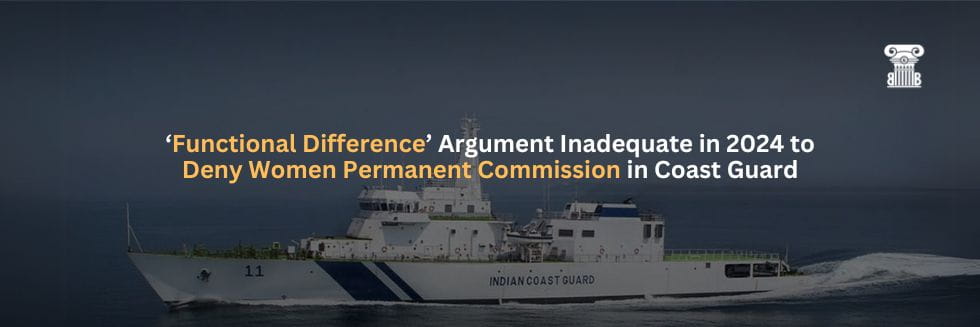In a significant case, Priyanka Tyagi, a woman officer in the Indian Coast Guard (ICG) sought permanent commission after serving since 2009. Her request was denied citing a lack of provision for permanent commission in the ICG. She approached the Supreme Court challenging this decision. The Court criticized the Union Government’s stance questioning why women were not given permanent commissions in the Coast Guard while they were in the Army, Navy and Air Force. The Court was unconvinced by the government’s argument about functional differences and instructed them to formulate a gender-neutral policy promptly. As a result, the Supreme Court directed the Union Government to reconsider its stance on denying women permanent commission in the Indian Coast Guard and urged them to develop a fair and gender-neutral policy.
CASE DETAILS:
Priyanka Tyagi v. Union of India & Ors.
Special Leave to Appeal (C) 3045/2024
Supreme Court
Coram: CJI DY Chandrachud and Justices JB Pardiwala and Manoj Misra
BRIEF FACTS:
- The woman officer/petitioner was appointed as Assistant Commandant (General Duty-Women) in 2009. She was subsequently promoted to the post of Deputy Commandant (GD) in 2015 and the post of Commandant (JG) in 2021.
- In 2021, she submitted a request for a permanent commission along with recommendations from her commanding officers.
- However, a year later, the request was returned without action citing the Ministry of Defence’s (MoD) letter dated February 25, 2019, which purportedly did not apply to the Indian Coast Guard (ICG). The petitioner was informed that no provision for permanent commission of Short Service Appointment (SSA) Officers existed in the ICG. Instead, the procedure for induction of women officers in the permanent cadre of the GD branch existed and the Permanent Commission/Short Service Commission (PMT/SSC) option had to be exercised at the time of enrolment.
- In May 2023, the petitioner received a release order following the completion of her engagement period. Dissatisfied with this, she approached the Delhi High Court.
- The High Court denied interim relief to the petitioner stating that if she was ultimately successful, she could be directed to be reinstated retrospectively. However, if she was not successful, any period spent in continuation of service as per an interim order passed would be deemed an illegal usurpation of office without entitlement.
- As a result, the petitioner was released from service in December 2023. Challenging the High Court’s order, she approached the Supreme Court.
OBSERVATIONS:
Addressing the Union Government, the Chief Justice of India stated: “You speak of ‘Nari Shakti’. Now show it here. You’re in the deep end of the sea. In this matter, you must come up with a policy that treats women fairly. After 2009, no woman has been inducted. Why are you being so patriarchal? You don’t want to see the face of women in the Coast Guard?”
Additional Solicitor General (ASG) Mr. Vikramjit Banerjee representing the Union explained that there was a difference between the stream of the Petitioner who was in the Short Service Commission (SSC) and the branch of Permanent Commission (PC) which the petitioner sought to be absorbed into. The issue was the transition sought from SSC to PC.
The bench asked what was so distinctive about the ICG that women could not have Permanent Commission there while the Indian Navy granted the same. The Court cautioned the Union to come up with a gender-neutral policy sooner.
The court stated: “Forget about her case, we will now deal with what you do to others. We are the Supreme Court, we may not give her liberty but we will see that Justice is done for women in ICG then we will open up the whole canvas, you better take instructions with what you want to do if women can guard the borders, they can guard the Coasts, it’s as simple as that.”
ORDER:
The Supreme Court was not convinced by the Union Government’s argument that there are functional differences in the Indian Coast Guard that prevent women officers from being granted permanent commission there unlike in the Army, Navy or Air Force and cautioned the Union to come up with a gender-neutral policy sooner.






